I first started blogging in June 2003. I had nothing much to say, but I had just discovered blogging – the word and the concept – and it fascinated me. I wanted to play around with the medium, so I set up a blog in Movable Type (I now use WordPress), and off I went. A decade later, here are my thoughts on blogging, copyright and music. The article was prompted initially by Lucy Williams’ article in the Guardian on 4th December, Academic blogging: a risk worth taking? Lucy had her blog plagiarized several times without attribution or payment. Yet she also says that blogging has a role to play for early career researchers and doctoral students. What follows is my long, long defence of why I wouldn’t use blogging for that purpose, and what I do think it’s for.
Blogs, diaries, journals, calendars, notebooks
I am writing this on a train, with my phone turned off, in longhand, without a computer, disconnected and private. That is a useful coincidence, since notions of privacy, the personal and the public are central to what I want to say.
I keep several diaries. One is purely chronometric, so to speak, just a year planner: it tells me when I am going to do what, and when I have done whatever that was, it provides me with quantitative data about my life. It’s a week-per-view from Wilkinsons. I think it cost £2.50. I mirror that on Google Calendar, where I also have a special calendar for conferences and seminars I might want to go to.
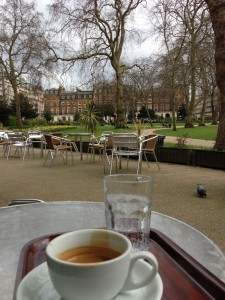
Another is a research diary for my PhD that I write as a blog that only I can see, using MAMP and WordPress. I opted for a blog because blogging has become an easy habit, and WordPress the easiest way to exercise it. In the Doctoral School at the Institute of Education, two lecturers in particular advised us to keep a research diary for similar reasons: one day, you may be asked to explain how or why you did something, and if you’ve kept a diary, you’ll know, easily. That diary – the research one – is private, because I am honest about my failures. For example, I don’t ‘get’ Foucault in a way that I don’t want to make public. Sometimes, I am delighted to find that I am not alone in those feelings, and in that respect, the research diary is valuable for recording doubt, almost more than certainty.
A third diary is my personal diary, which I write in a black faux leather A5 notebook from Wilkinsons, like a Moleskine but nearly 5 times cheaper. This is very personal, yet I have changed from using it to whatever feelings are on the surface on a particular day, to a kind of ‘gratitude diary’. Read Martin Seligman on happiness, and you’ll know why. Counting your blessings, however small, is a guarantee of joy, and the strongest buffer against depression. Diaries of ‘how I feel’ I have always thrown away, but those which were prompted by a demand to know what is good and worth giving thanks for, are a joy and encouragement when you read them later. Superficial streaks of what went wrong are there, coded in ways that only can decipher.

Then there is my camera. On research visits, I take pictures as part of an ethnographic record to help remind me of the materiality of places and events that are easily overlooked or forgotten, or become important later. Pictures can expand fleeting, forgotten moments like a balloon. In personal life, the journey from here to there may be marked by a sunset over the Thames that is what remains in memory, even though this is only a fraction of the whole. I recently met a researcher who asked me where I studied, and then immediately asked ‘What does it (i.e. the Institute of Education) sound like?’ (I had to think about it, which is surprising considering I wrote this post about listening to rooms) It was a genius question, that reminded me of a conversation that David Hockney described:
Oh yes! I was driving someone up here and I asked them what colour was the road. They didn’t answer. Ten minutes later, I asked the same question, and they saw it was different. Later he said, “I’d never thought what colour the road was.” Frankly, unless you’re asked the question, it’s just road colour. You have to look and ask questions like that about what you are seeing all the time. [Source:The Many Layers of David Hockney, Martin Gayford, Daily Telegraph, 23rd Sept 2011)
My research accumulates in Scrivener, the virtual equivalent of a room where the walls are covered with post-it notes and sheets of paper with drafts on. In here are my data, transcripts, pictures, and the ‘memos‘, where I interact with my data, question it, write about it.
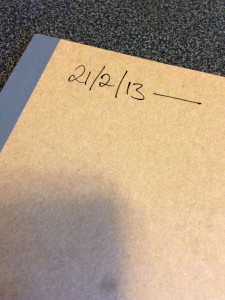
Then there are my Muji notebooks which I carry everywhere (and that’s what I’m writing this in). One notebook for everything that happens on the hoof – writing things down, lists, addresses, lecture notes is, I’ve discovered, better than having several. I can find things by a mixture of memory and association. I found a phone number once by remembering that I was reading a particular book in a plane in November. I found the notebook (they have a start and end date on the front) and leafed through until I found the bit where I had made notes on this book, and there, just where I knew it would be, was the phone number. The to-do lists remind me of the pressures that are easily forgotten about under pressure (ironically).
So what is this blog, then?
This blog represents what I am happy to leave in the front room with the curtains open. It is largely the opposite of what I write elsewhere. It is personal, but also about things I do not feel have complete ownership of. And indeed, when I first started blogging, that’s what blogging meant. It was was a log of what you had navigated on the web, a travelog of places visited. Rebecca’s Pocket – one of the first blogs in the world – is for me still the site that defines the form. That concept has changed now, and blogging has become a ‘platform’ for self-publishing, rather than the pointing-to and sharing of information that is out there already. So when I read that blogging is important for networking and early career researchers and so on, I get nervous. To me, this isn’t what blogging should be: it adds too much weight and responsibility to the writer. The whole point of blogging, for me, was that it gave you the opportunity to jot down some stuff quickly, in less time than you would ever spend writing an article. Because they’re personal, you don’t have to conform to a style guide and a company policy, and worry that your blog posts are being judged as if they were journal articles (see Katie Wheat’s post on a similar worry).
Why the long silences?
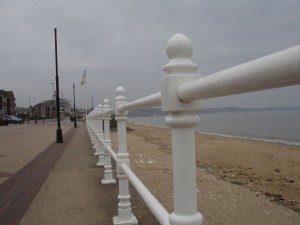
You may have noticed that I have written less since 2011. Some of that is just because of lack of time, but it is mainly because with my PhD work, much of the research I do is by agreement with those who participate in it, confidential, and for the purpose of the thesis, not to be broadcast on my blog. I have no right to use this data or my thoughts about it, on a blog. Neither am I, frankly, going to give stuff away that I have spent so long and hard thinking about. I don’t mind sharing, as I did last year, anecdotal stuff about playing for class. The world would be happier if playing for class was easier, and I am passing on what others have generously passed on to me. But research? No.
There is another reason. I’m deeply mistrustful and cynical about the way others use the web. I have seen grown professionals scrape data and writing from the web (so easily done, with copy and paste). Among teachers and students there is sometimes a Wild West mentality. We are too busy to think, too pressured by targets to create meaningful, original work, so anything goes. Lucy Williams’ article on the unattributed appropriation of her work should be a warning.
At the same time, others profit from ignorance, repotting the public domain in containers that earn a few dollars every time. If you know what is available from free sheet music sites like the IMSLP, then you don’t need to buy this stuff again from people have done no more than to stamp their name and a copyright notice on a scan.
The good news…
So what do I feel happy to give away this year? The answer is music of a certain kind, like the pieces I’ve posted in my Advent Calendar. They use public domain material and for the most part, I am using skills that are so well rehearsed that I don’t have to think hard. I might be pleased with some of the ideas, but they are largely reproductive, not creative, a distinction that I owe to a brilliant seminar with Paul Dowling.
Yet discourse about music often sanctifies the act of making music as if it were above every other kind of artisanal work. As for composers? Well, they’re superhuman, aren’t they? In his wonderful book published in August 2013, Why Music Matters, David Hesmondhalgh says that “[Howard] Becker showed that the idea that cultural works emerge from brilliant individuals us at best overstated, and at worst mistaken” (Why Music Matters, p. 127-128).
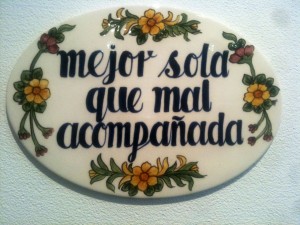
Having spent the last few years making large-scale recordings, I’m particularly aware of the collective nature of music making that Hesmondhalgh and Becker are talking about. It demands different kinds of labour from different people, or sometimes from the same person. If music did not, at some times, come to me as easily as touch-typing, I would not be able to do it at all. Yet typists do not attempt to copyright what they have typed as a ‘performance’ of a text. The comparison may be extreme, but I think the comparison is valid in quality, if not degree. After the floods in Prague in 2002, most of the streets near the river had to be taken up and re-cobbled, by men using such admirable skills that I could have watched them for hours. Yet they (I presume) did not expect to get royalties on their performance of cobbling every time someone walked over them.
By comparison, on November 1st, the copyright term in recordings was extended from 50 to 70 years, so that Cliff Richard may now continue to benefit from records he made over 50 years ago, for example. Lord Younger said that the changes “should help ensure that musicians are rewarded for their creativity and hard work throughout their careers”. My question is this: what is it about other kinds of work that we so readily assume (unlike with music) that the labour and skill has been exhausted and paid for at the time it was done? What is it about Cliff Richard’s (or any musician’s) work that he should continue to demand rent from it 50, 60, 65 years after it was done?
I believe that if we are to make sense of intellectual property (and there is a lot about that term that doesn’t make sense – see this article from TechDirt) then we have to question the basis on which different varieties of arguably similar labour are deemed to be inherently of such different value, that some can demand 70 years of royalties, while others are paid up in full (and not very well) at the point of execution.
The goodness of music – a question
And so to the final question: if music is so inherently good, then why is it so rarely given away as a gift? Hence the Advent Calendar. They’re only sketches, and rough round the edges. Some are better than others. Why charge for them? At a time of symbolic gift-giving like Christmas, what is the difference between making a cake for someone (which costs time and money, and demands expertise) and making a piece of music?
The difference is perhaps that, at worst, someone might take one of my pieces and in some way make money out of it (i.e. depriving me of the possible profit), whereas you can’t do that with a cake (except maybe once). And the problem here, as I see it, is not that making music and making cakes are essentially such different things, but that cake-making retains some of the generosity of spirit that the music industry has taken out of music. It’s expecting that music should always make money that’s the problem.
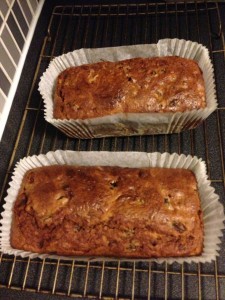
For the same reason, I cannot watch things like Masterchef. As one of the loveliest people I know once pointed out, what is discomforting about those shows is that they insult everything that is personal and heartfelt about preparing food. To make food for someone is a much more personal act than to make music for them. To have that act judged on its external, observable signs rather than on the spirit in which it was done (or to take away the meaning of the act in the first place, by making the preparation of food into a solo competition) represents for me everything that is vacuous and vile about TV production. It seeps cruelly into everyday life, as people charged with organizing MacMillan coffee mornings turn them into ‘Great British Bake-Off’ style events, where colleagues can vote for the best cake. Count me out.
Christmas Carols offer a particularly odd example of the problem. What kind of music could be more deserving of a ‘gift’ status in the world than carols whose music is in the public domain and intended to give praise to God and bring communities together? Yet the world of carols is no less subject to issues of copyright than any other, and I have had to steer very carefully away from them in so that I could give away as a free download something which is largely in the public domain and socially produced in the first place.
I am not saying that musicians should work for free, or that no-one should ever be able to profit from their original ideas. But I do think that to slap copyright notices on everything, however little labour or originality there may be in it, as if everyone who points a camera at a monument (for example) is now an author, is an exploitation of copyright that should be outlawed. Happy new year!


I’ve never been a diarist or journal keeper, but I am inspired to give it a try in 2014. It’s a good year for forming new, better habits.
The bit that I didn’t express very clearly (if at all!) is that there’s something very wonderful about writing that isn’t destined to be read by someone else. You can never have true privacy if at the back of your mind, you are thinking about who else will read your words, but that’s our default position now – did you see Edward Snowden’s Christmas message? Journal-keeping on paper is a way of defending your own sense of privacy and the personal. Happy 2014!
Thank you for sharing your thought.